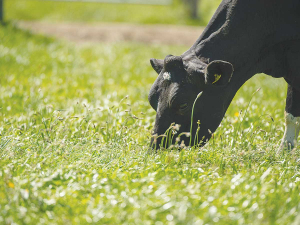DairyNZ Calls for Changes to Government’s Proposed Resource Management Act Reform
DairyNZ says the Government’s proposed Resource Management Act reform needs further work to ensure it delivers on its intent.
 New research shows that feeding cows plantain can reduce nitrogen leaching from dairy farms by 20 to 60%.
New research shows that feeding cows plantain can reduce nitrogen leaching from dairy farms by 20 to 60%.
New research has found that feeding cows the leafy herb plantain can reduce nitrogen leaching from dairy farms by 20 to 60%.
Results from the DairyNZ-led Plantain Potency and Practice (PPP) Programme, unveiled last week, show that using Ecotain plantain in pasture can significantly reduce nitrogen entering waterways.
Farm trials at Massey University and initial results from a trial at Lincoln University are showing similar trends.
The trials are part of the nationwide PPP research and development programme that partners with dairy farmers, industry and government.
DairyNZ chief executive Dr Tim Mackle describes the results as “exciting”.
“We now have robust scientific evidence that Ecotain plantain is an effective solution to help dairy farmers further reduce farm footprint and continue playing their part in improving water quality,” Mackle says.
“Plantain can bring significant benefits to local waterways and communities – we all want healthy freshwater to swim and play in, and dairy farmers can confidently use Ecotain plantain on-farm to support that.”
The $22 million seven-year PPP Programme is funded by DairyNZ, by the Government through the Ministry for Primary Industries’ Sustainable Food and Fibre Futures fund, PGG Wrightson Seeds and Fonterra, working with six additional research and delivery partners.
The programme uses Ecotain environmental plantain from Agricom because it has proven effectiveness. An evaluation system is available to assess the environmental benefits of all plantain cultivars sold by a range of providers.
At the Massey University farm trial, scientists are measuring nitrogen leaching from paddocks grazed by 80 dairy cows. After two years, the trial results have shown reduced nitrogen leaching by 20 to 60% in perennial ryegrass and clover pastures containing 30 to 50% Ecotain plantain.
The results are compared to traditional perennial ryegrass and clover paddocks (the most common pasture types in New Zealand). There was no difference in milk production between the plantain and control pastures in the trial.
The amount of reduced nitrogen leaching depends on the quantity of plantain in the pasture, the soil type, climate and farm system. The Massey University trial will continue for a further two years.
Initial results from the programme’s Lincoln University study in Canterbury, on lighter soils under irrigation, show similar trends to the Massey University trial, with a 38-50% reduction in nitrogen leaching from pasture containing 24% Ecotain plantain. More data is being collected to confirm these results.
Massey University’s Peter Kemp and his team have been researching the effects of plantain over several years and the experimental plots were established at the university in 2019.
“The four-year trial has had incredible success so far and our trial site allows the results to be directly transferable to current farming systems in New Zealand,” he says.
“Importantly for farmers, transition to plantain pastures results in no loss of production, while simultaneously reducing nitrogen leaching significantly from farms into freshwater.”
Budou are being picked now in Bridge Pā, the most intense and exciting time of the year for the Greencollar team – and the harvest of the finest eating grapes is weeks earlier than expected.
The Real Estate Institute of New Zealand (REINZ) has released its latest rural property report, providing a detailed view of New Zealand’s rural real estate market for the 12 months ending December 2025.
Rural retailer Farmlands has released it's latest round of half-year results, labeling it as evidence that its five-year strategy is delivering on financial performance and better value for members.
OPINION: "We are back to where we were a year ago," according to a leading banking analyst in the UK, referring to US president Donald Trump's latest imposition of a global 10% tariff on all exports into the US.
DairyNZ says the Government’s proposed Resource Management Act reform needs further work to ensure it delivers on its intent.
Overseas Trade Minister Todd McClay says he's working constructively with the Labour Party in the hope they will endorse the free trade agreement (FTA) with India when the agreement comes before Parliament for ratification.

OPINION: A mate of yours truly reckons rural Manawatu families are the latest to suffer under what he calls the…
OPINION: If old Winston Peters thinks building trade relations with new nations, such as India, isn't a necessary investment in…